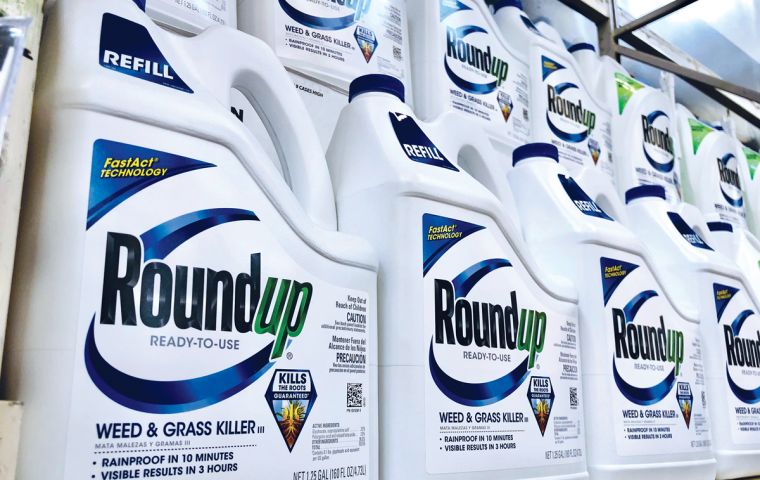MercoPress. South Atlantic News Agency
EU discussing approval of Roundup glyphosate for another ten years
 The EU's 27 members are expected to discuss the Commission proposal and will vote on the issue on October 13.
The EU's 27 members are expected to discuss the Commission proposal and will vote on the issue on October 13. The European Commission has proposed extending approval of the controversial weed killer glyphosate, long manufactured under the name Roundup, by 10 years. Approval in the European Union for the agrichemical is due to lapse this December unless member states agree to a reauthorization.
The EU's 27 members are expected to discuss the Commission proposal and will vote on the issue on October 13.
The German Agriculture Ministry, led by the Green Party, has said the renewal was “not justified.” Greenpeace had earlier seen a leaked document that revealed “the European Commission's eagerness” to reauthorize glyphosate, saying this was despite the herbicide's “negative effects on human health and the environment.”
The US chemical company Monsanto used glyphosate, a mixture of the organic phosphorus compound with other substances, to create the weed killer Roundup, which it first distributed in 1974.
Farmers worldwide continue to spray their fields with the herbicide to kill off green weeds before a crop is sown. The chemical spray also inhibits the growth of weeds that can outcompete crops while they are growing.
Pesticides containing glyphosate are now manufactured by several dozen chemical companies worldwide. Germany's Bayer AG acquired Monsanto, including its top-selling product Roundup, in 2018 and maintains “a leading position” in the herbicides market.
Killing wild weeds and plants on agriculture fields deprives insects of their habitat. This, in turn, deprives birds of food. “The herbicide destroys the nutritional basis for animals,” Jörn Wogram, head of the pesticide department at
Germany's Federal Environment Agency argued. “Thus glyphosate, along with other pesticides, threatens biodiversity.”
According to studies, glyphosate-based sprays might also alter genetic material and affect the nervous system in animals and humans. For example, a study by the University of Ulm found massive malformations in tadpoles, with disorders of the brain, heart, eyes and body shape due to exposure to the herbicide.
Since the toxin is spread through the air when sprayed on fields, it contaminates widely, from surface water and groundwater to agricultural produce. Traces have been found in human urine and breast milk.
Pesticides containing glyphosate are sprayed in large quantities in soy production, such as the genetically modified soy seeds created by Monsanto to be resistant to Roundup. Health consequences include a higher risk of cancer within farming communities.
“We can see very clearly that people are getting sicker from glyphosate,” said Medardo Avila Vazquez, a physician at the University Hospital of Maternity and Neonatology in Cordoba, Argentina. “In certain rural areas, they are three times more likely to have cancer,” added the co-author of studies on the health impacts of glyphosate on farmers.
The use of glyphosate in soybean-growing areas increased the number of miscarriages by a factor of between two and three, Avila Vazquez told DW. Meanwhile, damage to genetic material “quadrupled the number of malformations,” he added.
At the University of California, Berkeley, Cancer researchers have established the link between glyphosate and certain types of lymphoma, including non-Hodgkin lymphoma.




Top Comments
Disclaimer & comment rulesCommenting for this story is now closed.
If you have a Facebook account, become a fan and comment on our Facebook Page!